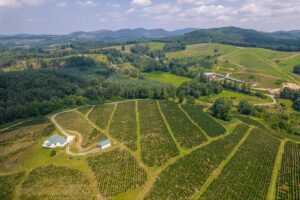Introduction
Selling rural or agricultural land can be a complex yet rewarding process for real estate agents. Given the unique challenges and considerations involved, the commission structure for these transactions often differs from standard residential sales. Rural or agricultural land sales may require a deeper understanding of local regulations, land use rights, and farming practices. This article explores how agents handle commissions when selling rural or agricultural land. We look at commission rates, payment structures, and the nuances distinguishing these sales from other real estate transactions.
Commission Rates for Rural or Agricultural Land Sales
When selling rural or agricultural land, real estate agents typically earn a commission based on a percentage of the property’s sale price, similar to residential real estate. However, the commission rates for rural or agricultural properties often vary more widely, ranging from 3% to 10% of the sale price. Several factors can influence the commission rate, including the size of the property, its location, and the transaction’s complexity.
-
3% to 10% Commission Range: Properties with higher sale prices, such as large farms or ranches, tend to have lower commission percentages because the dollar amounts involved are much more significant. For example, on a multimillion-dollar sale, even a 3% commission can result in a substantial payout. On the other hand, smaller rural properties, or those located in high-demand areas, may command higher commission percentages, as the sale prices may be lower and the transaction more straightforward.
-
Influence of Property Type: The rural or agricultural property also plays a role in determining commission rates. Properties for recreational purposes, such as hunting grounds or vacation retreats, may attract a buyer pool different from working farms or ranches. Agents who understand the nuances of these various property types can market them effectively and potentially negotiate higher commissions based on their specialized knowledge.
-
Higher Complexity, Higher Commission: Certain transactions may justify higher commission rates due to their complexity. For example, properties with water rights, land-use easements, or specific zoning restrictions may require more effort from the agent to navigate the legalities and market the property effectively. In these cases, agents with expertise in rural property sales can often command higher commissions as a reflection of the additional work required.
Negotiating Commissions for Rural or Agricultural Land
Unlike residential real estate, where commission rates are often more standardized, rural and agricultural land sales offer greater flexibility in negotiating commission structures. Given the longer sales cycles, specialized expertise, and varying market demand for rural properties, this flexibility is essential.
-
Market Conditions: In competitive rural real estate markets, where demand for land is high, agents may be able to negotiate higher commissions. Conversely, sellers may push for lower commission rates in slower markets, knowing that the property might take longer to sell and require additional marketing efforts. Agents must be prepared to adapt their commission proposals to reflect the specific conditions of the rural market in which they operate.
-
Property Size and Value: The size and value of the property play a significant role in commission negotiations. For example, a vast agricultural property expected to sell for several million dollars may result in a lower commission percentage. However, the total commission will still be significant due to the property’s high value. On the other hand, smaller rural properties with lower sale prices may result in higher commission percentages to ensure the agent is compensated fairly for their efforts.
-
Specialized Expertise: Agents with experience and expertise in selling rural and agricultural properties can often negotiate higher commissions. Their specialized knowledge of zoning laws, farming practices, water rights, and land use regulations adds value to the transaction, making them indispensable to sellers who may not be familiar with these complexities. In these cases, sellers may be willing to offer higher commission rates in exchange for the agent’s expertise and ability to close a more complex sale.
Payment Structure: When Do Agents Get Paid?
As with other types of real estate transactions, agents handling rural or agricultural land sales are typically paid their commission at closing. The commission is deducted from the sale proceeds and usually disbursed through an escrow account. If both a listing agent and a buyer’s agent are involved, the commission is split between them.
-
Timing of Payment: The nature of rural property transactions often results in longer sales cycles, as it can take more time to find a suitable buyer, especially for large or specialized properties. Buyers for agricultural land or large rural estates often conduct extensive due diligence, including inspections of soil quality, water rights, and zoning regulations. This longer sales process can mean that agents must wait longer to receive their commission, which makes the timing of the payment a critical consideration.
-
Escrow and Closing: As in residential real estate, once the rural property sale is finalized, the commission is distributed from the escrow account at closing. This ensures that the agent is compensated as soon as all the legalities are settled and the buyer takes ownership of the property.
Specialized Knowledge Required for Rural and Agricultural Land Sales
Rural and agricultural land transactions can be far more complicated than residential sales. Real estate agents working in this niche often possess specialized knowledge to handle the unique challenges associated with rural properties. This expertise can justify higher commissions and help agents navigate the complexities involved in these sales.
-
Zoning Laws and Land Use: When selling rural land, understanding local zoning laws is essential. For example, specific properties may be zoned exclusively for agricultural use, while others may have the potential for residential or commercial development. Agents well-versed in local zoning regulations can provide valuable insights to buyers and help sellers market their properties to the right audience.
-
Water Rights and Mineral Rights: In many rural areas, the rights to water and minerals are separate from the ownership of the land itself. Agents must understand how these rights affect the value of the property and be able to explain the implications to potential buyers. This level of expertise is crucial for properties that rely on water access for agricultural purposes or may contain valuable mineral deposits.
-
Agricultural Practices and Regulations: Agents selling agricultural land must have a solid understanding of farming or ranching practices and any relevant agricultural regulations. This includes knowledge of soil quality, irrigation systems, crop yields, and livestock operations. Buyers of agricultural land often need this information to determine the property’s value and potential for profitability.
Considerations for Agents Working in Rural Markets
Selling rural or agricultural land presents unique challenges, and agents must be prepared to handle the longer sales cycles and more intensive research required for these transactions.
-
Longer Sales Cycles: Rural properties, particularly large or specialized ones, often take longer to sell than residential homes. This extended timeline can result in a longer commission wait, so agents must be patient and diligent. Marketing rural properties also require different strategies, such as targeting buyers interested in agriculture, recreational use, or large-scale development.
-
Negotiation Skills: Given the flexibility in commission rates, agents must be adept at negotiating with sellers. Factors like property size, market demand, and the complexity of the transaction can all influence commission negotiations. Agents who can effectively demonstrate their value, mainly through specialized knowledge, will have an advantage in securing favourable commission agreements.
-
Building Relationships: Working in rural markets often means building long-term relationships with buyers and sellers, many of whom may own multiple properties or have connections in the local agricultural community. Developing these relationships can lead to repeat business and referrals, which are critical for success in rural real estate.
Conclusion
Real estate agents selling rural or agricultural land typically earn commissions ranging from 3% to 10% of the sale price, depending on the property’s size, complexity, and location. These transactions often require specialized knowledge of land use, zoning, water rights, and agricultural practices, which can justify higher commission rates. Commissions are paid at the sale’s closing, and agents must be prepared for potentially longer sales cycles and more complex transactions.
Rural and agricultural land sales are more intricate than standard residential transactions, requiring real estate agents to possess specialized knowledge and skills. The flexibility in commission rates reflects the unique nature of these sales, and agents who excel in this niche can command competitive commissions. Agents can succeed in this specialised market by understanding the complexities of rural property sales and negotiating favourable commission structures.





